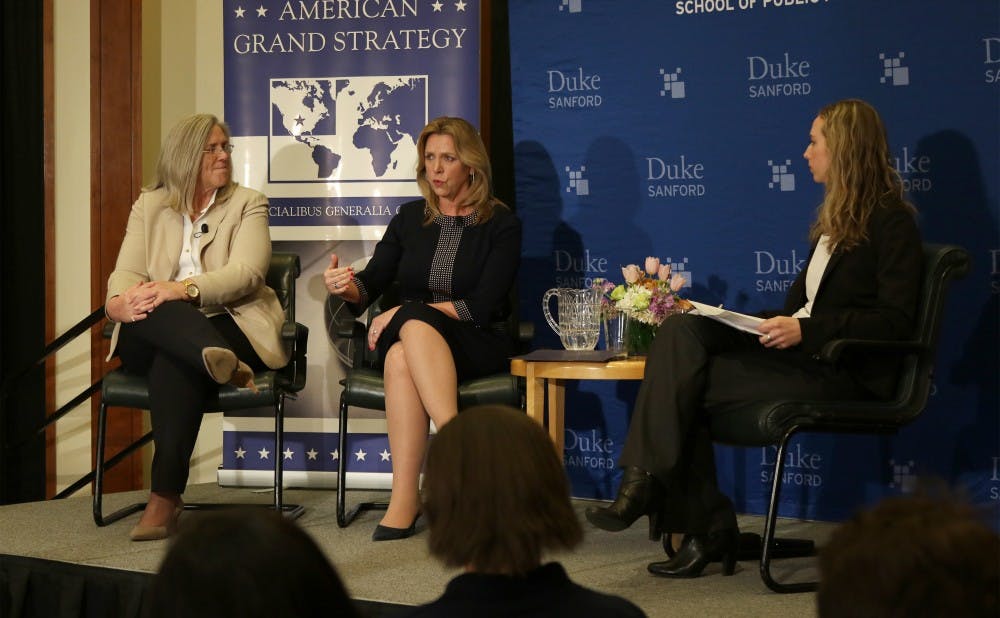Sue Gordon, deputy director of the National Geospatial-Intelligence Agency, spoke last week as part of a Women in National Security panel about the importance of technology in intelligence and of public-private partnerships. The Chronicle’s Adam Beyer sat down with Gordon, Trinity ’80, to discuss her transition from Duke into the field of national security.
The Chronicle: Could you talk about what you see as the role of the NGA within the broader national security apparatus?
Sue Gordon: The intelligence community has 16 agencies, but there are five big ones: CIA, NSA, DIA, NRO, and the NGA. Each one kind of has a special responsibility but as a collective, our job is to know the truth, to be able to see beyond the horizon and be able to allow enough information to act on foreign intelligence. NGA has a particular responsibility for having command of geospatial information. It is two things: it is imagery of the earth from space—typically but not exclusively—and then mapping, geography, cartography.
TC: How do you advise young people who are interested in going into national security fields, particularly young women?
SG: I’m a public servant at heart. I love serving my country. I love doing something bigger than yourself, so what is great about a career in national security is that number one, it is the most challenging, purposeful job you can ever imagine. To be part of the machine that figures out how you affect that purpose is pretty exciting because it’s big, but it’s unknown. So if you’re like me and you want to solve problems and have room to create something, within that context of great purpose is the opportunity to make a difference.
And the last thing I’ll say is you typically get opportunity through responsibility really early. You get to feel the weight, and if I were talking to any group of students I would say, “If I’ve had success, the key is to feel the weight early, to take on hard jobs as early as you can. Fail as early as you can when there are people around you who will protect it from being too big.” And for women, when I started, I was in an office of about 700 people who did technical analysis of foreign weapons systems and there were three professional women out of 700. If you walk down the halls today, it’s going to be pretty much 50-50.
TC: Do you think students today have a different vision of themselves in relation to public service?
SG: I think there have been a lot of things that do not put public service in a great light, whether it’s the Snowden incident or cheating at the IRS or any of the things that you hear. There’s a little bit more of a drumbeat questioning the integrity of government, which I worry makes people have a very skewed view of what it really is. But we don’t seem to have trouble attracting young people. It still is a mission for people who are looking to change the world to have a venue to do it.
TC: There’s a lot of fear in America right now. Do you think that’s warranted?
SG: I think this is a really dangerous world—it’s in flux. You have weapons and technology that allow countries to have reach that they could never have before where the oceans were an incredible buffer. I think what’s interesting about this world is just the fluid nature of it and the number of factions that can have power without land and reach that extends their border. I think we do an awfully good job as a nation protecting the American people, but it’s a dangerous world and it’s not just in terms of physical danger but economic danger as well. I don’t think it’s overblown but it is interesting that there is more to the complexity of the relationships.
TC: What is the biggest thing you learned over your career and what did you not know when graduating Duke that you wished you knew?
SG: Number one is you’re not stuck with the knowledge you have right now. Your career and life are so much longer than you think they will be. The second is don’t decide ahead of time what you can’t do. One of the things I find about young people is that many think when it gets hard, it means they’re not supposed to do it. It’s all hard. Any accomplishment is difficult and so when you want to take something on and it gets hard, that usually means you are doing the right thing. I wish I had understood how important it is to be a decision maker. You have to practice that early because there will come a day when 10,000 women and men are trusting you, they’re folding their hands, and you’re jumping into the abyss and you have to be good enough to learn how make that decision, because if you wait there won’t be any progress.
TC: Do you still keep up with the [women’s] basketball team since you played for Duke?
SG: I do. All my girls. All the girls I played with are still a really tight group. We come back all the time. We’re like any set of old alums, you know cheering and then judging them as if we were as good as they are.
Get The Chronicle straight to your inbox
Sign up for our weekly newsletter. Cancel at any time.
Adam Beyer is a senior public policy major and is The Chronicle's Digital Strategy Team director.

